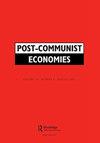Strategic drivers behind the digital transformation of subsidiaries: a longitudinal approach
IF 1.8
3区 经济学
Q2 ECONOMICS
引用次数: 1
Abstract
ABSTRACT This study explores the strategic drivers of digital transformation (DT) at subsidiaries. Our research framework derives strategic drivers from a tripod model that integrates the resource-based, the institution-based, and the industry-based views. We use two longitudinal case studies at global automotive suppliers’ Hungarian subsidiaries. We found that each view highlights a different set of strategic drivers. DT in the subsidiaries is boosted by proactive local management and mature process improvement routines (dynamic capabilities); parent–pull relation (internal institutions) and state support attracting manufacturing FDI (external institutions); as well as buyers’ increasing expectations and supplier-related factors (industry-based view). By combining these views, we claim that drivers related to the external institutional context and the industrial competition are usually filtered by the global management before contributing to resource adjustments at subsidiaries in a coercive top-down manner. Despite this seemingly deterministic DT process, local managements can actively shape DT, even that of the MNE.子公司数字化转型背后的战略驱动因素:纵向方法
摘要本研究探讨了子公司数字化转型的战略驱动因素。我们的研究框架从三脚架模型中得出战略驱动因素,该模型融合了基于资源、基于机构和基于行业的观点。我们在全球汽车供应商的匈牙利子公司使用了两个纵向案例研究。我们发现,每种观点都突出了一组不同的战略驱动因素。积极主动的本地管理和成熟的流程改进程序(动态能力)推动了子公司的DT;母拉关系(内部机构)和国家支持吸引制造业外国直接投资(外部机构);以及买家日益增长的期望和供应商相关因素(基于行业的观点)。通过结合这些观点,我们声称,与外部制度环境和行业竞争相关的驱动因素通常会被全球管理层过滤掉,然后以自上而下的强制性方式为子公司的资源调整做出贡献。尽管这种看似确定性的DT过程,但当地管理层可以积极塑造DT,甚至是MNE的DT。
本文章由计算机程序翻译,如有差异,请以英文原文为准。
求助全文
约1分钟内获得全文
求助全文
来源期刊

Post-Communist Economies
ECONOMICS-
CiteScore
4.90
自引率
18.20%
发文量
21
期刊介绍:
Post-Communist Economies publishes key research and policy articles in the analysis of post-communist economies. The basic transformation in the past two decades through stabilisation, liberalisation and privatisation has been completed in virtually all of the former communist countries, but despite the dramatic changes that have taken place, the post-communist economies still form a clearly identifiable group, distinguished by the impact of the years of communist rule. Post-communist economies still present distinctive problems that make them a particular focus of research.
 求助内容:
求助内容: 应助结果提醒方式:
应助结果提醒方式:


